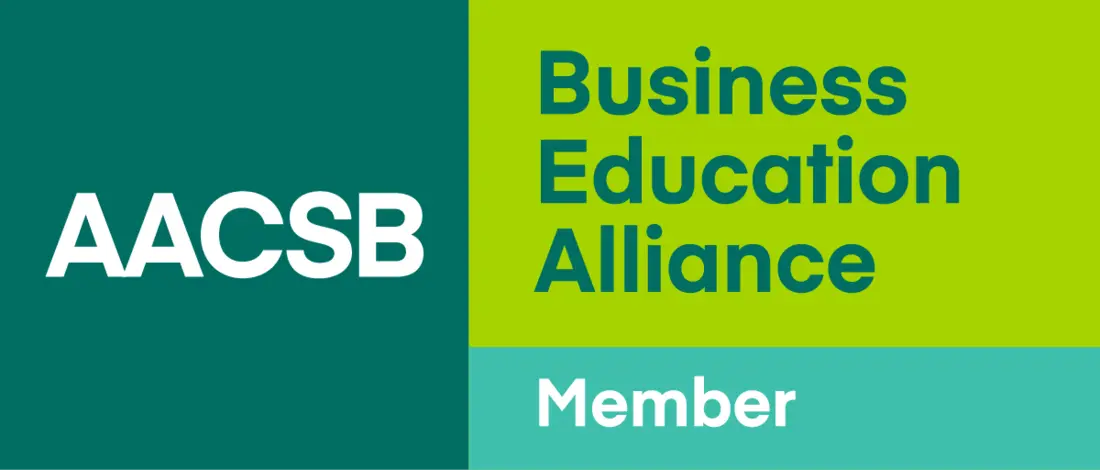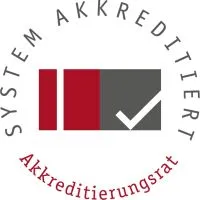Product manager at an automotive manufacturer, social media manager at a tech company or founder of their own video start-up - our graduates have taken these and many more career paths. It shows that after your studies in the Bachelor’s degree program Digital Business, countless options are open to you. And that’s why: we teach the necessary skills for the design, implementation and management of digital business models, innovative business processes and online products and services in a practice-oriented manner based on the latest scientific findings. Numerous field studies take place as part of the program, where you can put your newly acquired knowledge into practice and together with companies from the region.
Are you interested in digitalization, creative techniques and modern technologies such as chatbots or virtual reality? Would you like to design digital business models of the future? A solid foundation in business administration is important to you? Then the Digital Business (B.A.) degree program is just right for you.
Digital Business (B. A.)
Bachelor of Arts (B. A.)
7 Semester
Winter
Yes Admission information
Yes
Yes
German
Double Degree possible
Ingolstadt
Structure
Digital Business is an undergraduate programme of seven semesters and is modular in structure.
The first three semesters focus on basic skills:
- Business skills are acquired in the modules on business management, marketing, accounting, logistics, HR management and organisation.
- IT skills are taught in the modules dealing with internet technologies, software development basics and digital services in the front and back office.
- Students acquire methodological skills in classic and agile project management methods, business process management, methods of scientific working and quantitative methods.
- Language skills are enhanced through the teaching of English for business purposes.
- Practical work experience is provided by means of an eight-week basic internship to be completed between semesters before the start of the fourth Semester.
The second degree phase (4th - 7th semester) comprises three theoretical study semesters and one practical semester of 18 weeks in the 5th or 6th semester. The three theoretical study semesters consist of the following modules:
- In-depth business skills cover business strategy and digital business models, corporate social responsibility, IT law and digital business law.
- The advanced IT skills taught are IT security management, business intelligence, business analytics and digital entrepreneurship.
- Interdisciplinary skills are acquired in modules dealing with business modelling and business planning, a social project, an in-depth seminar on digital business and an innovation project.
Students can specialise according to preference by opting for an alternating selection of four in-depth modules.
One freely selectable specialised technical module, a freely selectable module on sustainability and a freely selectable module on linguistic and social skills allow students to develop their intercultural, international, linguistic and social capabilities.
Students finish off the course by completing a bachelor’s degree assignment in the seventh semester to gain a Bachelor of Arts (B.A.) degree.
1. Semester
Basics of Business Administration
Bookkeeping, Accounting and Cost Accounting
Basics of Digital Business
Introductory Seminar: Digital Business
Quantitative Methods
Business English
2. Semester
Digital Marketing
Business Process Management
Software Development
Digital Services: Front End
Project Management
3. Semester
HR Management and Organisation
Internet Technologies
Digital Services: Backend
Agile Methods
Logistics and Value Chain Management
4. Semester
Business Strategy and Digital Business Models
Corporate Social Responsibility
Digital Entrepreneurship
IT Security Management
Business Intelligence and Business Analytics
Linguistic and Social Skills
Social Project
Seminar Scientific Methods
5. Semester
IT Law and Digital Business Law
Business Modelling and Business Planning
Innovation Project
Specialisation Modules on Digital Business
IT-Management
6. Semester
Internship (recommended) (also possible in other sem. in case of fulfilling requirements)
Scientific Subject-Matter Skills
7. Semester
Specialisation Seminar Digital Business
Specialisation Module Digital Business
Modules on Sustainability
Bachelor's Thesis
Quick Info
Acceptance to admission-restricted Bachelor study courses takes place via the “dialogue-oriented service procedure” (DoSV) of the portal “Hochschulstart.de”. It is necessary for applicants to apply BOTH via the application portal of the Technische Hochschule Ingolstadt as well as via the “Hochschulstart.de” portal.
Find here more details about the application process at the THI.
International students
Anyone with an international university degree/higher education qualification wanting to study at a university in Germany needs a so-called Hochschulzugangsberechtigung (HZB), or higher education entrance qualification. This lets applicants show that their educational background or professional qualification allows them to study in Germany, i.e. they have the necessary higher education entrance qualification to register for a course.
The recognition of the qualification is linked to certain requirements. If the certificate of education is recognised as a higher education entrance qualification in Germany, the international student may apply for all courses (general qualification) or for certain courses (subject-specific qualification). Two to three semesters of study in the home country may be recognised as a higher education entrance qualification in Germany, depending on the country of origin. Source: German Academic Exchange Service, DAAD, June 2016.
The following link provide information for university applicants from abroad about the application process at the THI.
Combine business and digitalization and create the future with a degree in Digital Business (B.A.). News degree course Digital Business!
The dual studies programme enables a combination of practical training elements in a company with the theoretical education provided by the university. There is a choice of either the joint model (academic study + vocational training) or the degree course with vocational experience (academic study + intense practical phases). There is an obvious advantage to students here: practically oriented academic study generally enables a particularly smooth transition from university to the world of work. What is more, the student usually receives financial remuneration from the company concerned.
The Digital Business course offers both models.
In the joint model, students may start working at the company several months before the start of the first semester, depending on the company concerned. At the start of the course there is an alternation between theory (during the semester) and practical experience (between semesters and during the practical semesters). In order to embark on a dual studies programme, students have to apply to both a company and to THI (be sure to take note of company application deadlines!).
More info on our dual studies-pages, or check dual cooperation partner companies. Even if no partner company is currently active in this degree programme, you are welcome to contact us.
Should you have further questions about the Bachelor's degree course Digital Business, please contact dbiz@thi.de.
Digital Business Manager
Digital business derives from the fact that information and communication technology are not used for service provision alone. In many sectors, the products and services themselves have software and devices such as sensors as deeply integrated elements and are interconnected with each other (Internet of Things/Services).
On the one hand this gives rise to new digital business models, as is the case with Airbnb, Wimdu and Uber, which act as agencies for private accommodation and transportation services. But existing business models also have to be digitally enriched or altered in order to gain or generate a competitive advantage (digital transformation). An example is Kärcher, a company which fits its sweeping and cleaning machines with telematics modules that relay information on operating times, locations, charge status and potential problems. As a result, Kärcher is able to offer its customers additional solutions such as analysis of idle time or preventive maintenance.
In order to be actively involved in such developments and to be able to manage them, staff have to possess sound skills both in the area of business administration (e.g. marketing, business process management and strategic management) as well as in the area of IT (e.g. development and operation of innovative services) - and they must be able to creatively combine the two areas. The following is a selection of tasks commonly found in this vocational field:
Project and leadership tasks at internationally oriented SMEs and large-scale corporations of all sectors in the following areas (selection):
Project tasks
- Planning, development and implementation of digital business services
- Digital business architecture management
- Digital business governance
- Integration of digital business services in business processes along the value creation chain
- Digital business intelligence and digital business analytics
Once an individual has gained the relevant job experience, he or she will be able to take on a broad range of management tasks.
Management tasks
- Strategic management incl. development of digital business models
- Digital business services portfolio management
- Product management for digital business services
- Business development for digital business models and digital business services
- Management and development of customer and supplier relations (CRM, SRM) based on digital business services
The degree course also provides an excellent basis for setting up a business within the entire digital value creation chain.
- "Basic internship”
- "Funding"
- "Special points"
THI is currently canvassing for cooperation partners to offer in-depth practical experience.
Co-operation partners for the study with in-depth practice are currently being acquired.
THI has set itself the goal of encouraging as many students as possible to undertake a study trip or internship abroad. This is because international experience enhances job prospects - not just due to the language skills acquired abroad but first and foremost because of additional qualities such as independence, tolerance and flexibility.
For this reason we would encourage you to take this opportunity and make the most of the study trip or internship programmes offered by THI in other countries. Our international network consists of more than 150 partner universities as well as numerous international companies and it is growing constantly worldwide. In this connection, students should feel free to use the International Office as a central point of contact.
The Double Degree offers you a special opportunity: Here you study at least one year at one of our partner universities in Australia or Scotland and thus successfully complete your studies with a double degree. Our International Office is the central contact point for all students.
Compared to the Bachelor Media Psychologie and Digital Business, some study contents are similar, others vary partly strongly. This table lists similarities and differences.
As of winter semester 2024/25, THI charges service fees of 500 euros per semester for students from third countries (outside the EU and the EAA (European Economic Area) . If you have any questions, please go to Contact for prospective students
Pleae note: No fees for exchange students, visiting students, participants of summer school!
Degree program director

Prof. Dr. Christian Locher
Phone: +49 841 9348-3588
Room: F230
E-Mail: Christian.Locher@thi.de
More Contact Options

Marlene Günther, B.A.
Phone: +49 841 9348-4614
Room: F204
E-Mail: Marlene.Guenther@thi.de
Module Handbook
Read more about the module handbook.
Study and Examination Regulations
Study and examination regulations (SPO) (German only) deal with judicial matters concerning your study course. You find all SPOs on the website of the legal department.

![[Translate to English:] Prof. Dr. Christian Stummeyer unterrichtet in einem Seminar des Studiengangs Digital Business](/fileadmin/_processed_/c/4/csm_Lehre_09A3122_TK_0d8d001373.webp)



![[Translate to English:] Logo Akkreditierungsrat: Systemakkreditiert](/fileadmin/_processed_/2/8/csm_AR-Siegel_Systemakkreditierung_bc4ea3377d.webp)








![[Translate to English:] Logo IHK Ausbildungsbetrieb 2023](/fileadmin/_processed_/6/0/csm_IHK_Ausbildungsbetrieb_digital_2023_6850f47537.webp)



